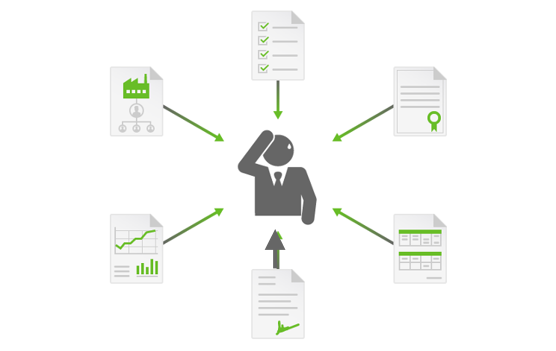
In the recently released EcoVadis/HEC Sustainable Procurement Barometer, 97% of organizations surveyed consider sustainable procurement important or critically important. It is clear that mass adoption of sustainable procurement has arrived. Organizations have realized that sustainable procurement, and understanding the sustainability of their supply chains, is a core tenant of any modern sustainability program. Of course, this realization is not an end in itself, but it is the beginning of a journey towards unlocking value in the form of reduced risk, increased efficiencies, and market differentiation.
This organizational enlightenment has translated into grand initiatives, goals, and public proclamations, forcing sustainability practitioners, procurement departments, and compliance officers to figure out how to execute. Most started following a natural progression: determine what is important to us, ask our suppliers where they stack up, and roll the answers into some sort of analytics tool for reporting.
This sounds great until you think about this model’s ability to scale. As organizational pressures for competitiveness and compliance increase, more and more have developed their own questionnaires (self-assessment questionnaire or SAQ). If you fast forward until today, companies in the b2b environment receive tens, hundreds, or thousands of surveys to fill out. The logistical challenges of managing this are clear, but it ultimately leads to even more severe and counter-productive issues:
Materiality: I recently had an airline, large bank, and plastics manufacturer approach me for guidance on an identical survey each had received from a pharmaceutical company. That means the survey either (a) used the least common denominator to develop questions, leaving out anything that doesn’t apply to each of those (incredibly diverse) industries; or (b) included questions that were completely irrelevant to some, but critical to others. In other words, the survey is either incomplete or asking for unnecessary information.
Data quality: The sheer workload and backlog created by a growing number of surveys is unmatched by the resources required to complete them accurately and expeditiously. Responses have thus become ‘check the box’ exercises as opposed to true representative answers and are often filled out by an account manager aiming to please a client. Another side effect is that any value that could be gained by the assessee throughout the process and results analysis is often lost.
Declines: Last month, a sustainability practitioner from a Fortune 50 company told me she receives 40 client survey requests per month! Eventually, decisions need to be made as to whether resources will be allocated to answering a growing number of surveys, and there comes a point when not answering is worth the business risk. This creates transparency gaps through the value chain and friction between business partners.
Needless to say, the approach to gathering supply chain sustainability data needs to be rethought. Why not just follow the process used to gather other data from suppliers? Simple – because price, quality, and on-time delivery have universal metrics, and sustainability does not (yet). However, there are ways that we can continue to work towards the change we seek without being paralyzed by the issues described above. A universal solution can address the issues above and reduce (and perhaps eliminate) questionnaire fatigue altogether by including the following capabilities:
1. Customization. Organizations must focus on issues material to the assessee, not the requestor/themselves. This paradigm shift is critical for a number of reasons. Firstly, it aligns potential risks to the size, geography, and industry of the company in question. For example, would you want your five-person Silicon Valley IT consultant struggling to answer questions about deforestation? Or your soy farmer questioned about their ISO 27000 information security processes? Secondly, it enables a deeper dive into the assessee by customized questions for the assessee. Thirdly, it provides relevant feedback to the assessee, specific to their operations and ecosystem, which in turn yields additional benefits including enhanced supplier engagement, performance improvement capabilities, and increased response rates. Finally, it fuels collaboration by providing a single set of results that the supplier can share with other clients and key stakeholders.
2. Due diligence. A survey/questionnaire process would have been carried out in vain if the resulting data were not accurate. Even if an organization is only seeking to ‘check the box’ and prove that it has asked its business partners about their compliance, at some point in the future, questions about due diligence will come up: What did you do to verify? Did you simply trust that they were policing themselves and telling the truth? On-site audits can help, but these entail their own set of challenges (see this recent Forbes magazine article). Consider solutions that provide third-party validation of policies, actions, and results either continuously or regularly, and that leverage technology to do so efficiently and cost effectively.
3. Collaborative platform. A trendy buzzwords these days, collaboration is key to unlocking value for many stakeholders. Selecting a solution that enables collaboration is essential to driving continuous improvement and efficiencies that benefit both the requestor and assessee. A collaborative platform also allows assessees to easily share results with other requestors, incentivizing both parties to steer away from additional questionnaires. Additionally, collaborative platforms can serve as the foundation of inter- and intra-industry collaboration, providing a single system of record for working towards harmonized goals such as the UN SDGs.
In conclusion, if you want organizations to invest their time and resources on real sustainability performance improvements rather than on redundant surveys, here are some steps that you can take:
1. Ensure that your organization selects a solution that includes the three capabilities above (assessee materiality, due diligence, collaboration)
2. Advocate to your business partners (clients, vendors, investors, loanees, etc.) the value of selecting a solution that includes these capabilities.
We are all in this together, and only we can save ourselves from ourselves!
Reporting by:
Sean Barr, Senior Account Executive, EcoVadis
About the Author
Follow on Twitter Follow on Linkedin Visit Website More Content by EcoVadis EN






















